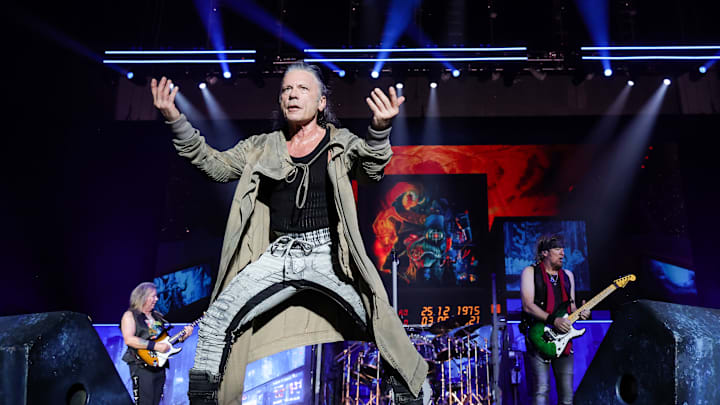Bruce Dickinson recently discussed the concepts of leadership and equality within Iron Maiden, asserting that a team requires a leader. On the Brazilian TV talk show Conversa Com Bial, Bruce Dickinson was asked if Iron Maiden operated as a democracy. He responded: "Ultimately, you can't have a team as a democracy. A football team is not a democracy. You've gotta have a manager, you've gotta have a captain, you've gotta have a game plan, and people have gotta stick to the game plan."
"Now, you can disagree, you can have discussions and you can have arguments because, when you're passionate about something, you have arguments." Dickinson elaborated, noting that even a leader doesn't make all decisions unilaterally, as sometimes the "my way or the highway" idea can hold things back: "You can sometimes have areas where the coach will go, 'You know what? I'm not in charge of the physiotherapy department. If the guy in charge of the physiotherapy department tells me that I need everybody to do this, this, this, that's what we're gonna do.'"
He explained that Iron Maiden’s approach is collaborative and fluid: "So, with Maiden, we divide things up and things seem to work quite naturally now, organically. Like, if Steve [Harris] really is crazy about 'I'm gonna do this, this, this' musically, I'm, like, 'Okay.' So me and Adrian [Smith] will write stuff, and if it fits, great; if it doesn't, not a problem."
How seriously should we take Bruce Dickinson on this?
Iron Maiden, a pioneering force in the heavy metal scene since their formation in 1975, is known for their elaborate stage shows, complex musical compositions, and lovable zombie-esque mascot, "Eddie." Founding member and bassist Steve Harris, along with long-time members like guitarist Adrian Smith and vocalist Bruce Dickinson, have contributed significantly to the band's iconic status and musical evolution. Their collaborative dynamic has been a key element in maintaining their success and relevance over the decades.
Obviously (at least to me), one should not take Dickinson's words too seriously, as he most likely meant his take on "democracy" in the most apolitical way possible. In fact, if anyone out there does use Dickinson's analogy as an excuse to slam democracy as a general concept, I'd recommend they check out what Brazilian musician and political activist Caetano Veloso stated about anti-democratic forces (coincidentally, also during an interview on a Brazilian TV talk show): "When you achieve human rights you should never let them be taken back from you in any way under any pretext..."
Am I reading too much into this? Possibly, but...
Unfortunately, in this day and age, one might take Bruce Dickinson's relatively benign words and run with them like a political football (to borrow from Dickinson's analogy), using them to further justify and rationalize anti-democratic inclinations within society. However, there may be reason to distinguish, at least somewhat, between a band or a sports team and other social institutions. They are not exactly the same, even though we can compare and contrast them to one another.
At the same time, as we have seen time and time again, and as Dickinson himself seems to agree: If a band winds up becoming too unfair, or too this or too that, it can also collapse, just as any institution can. The trick is to find some middle ground, which becomes impossible if things are pushed too egregiously far in some absurdly uncompromising direction.
In other words, some things work until they don't, and it's largely up to us as individuals to make these determinations for ourselves. Just as a band or a sports team can lose under certain leaders, or by making certain boneheaded choices, so can anyone else. Music is a benefit to human beings overall, often with cognitive benefits. So try to enjoy it, and take it seriously only in the healthiest, most intelligent sense,
